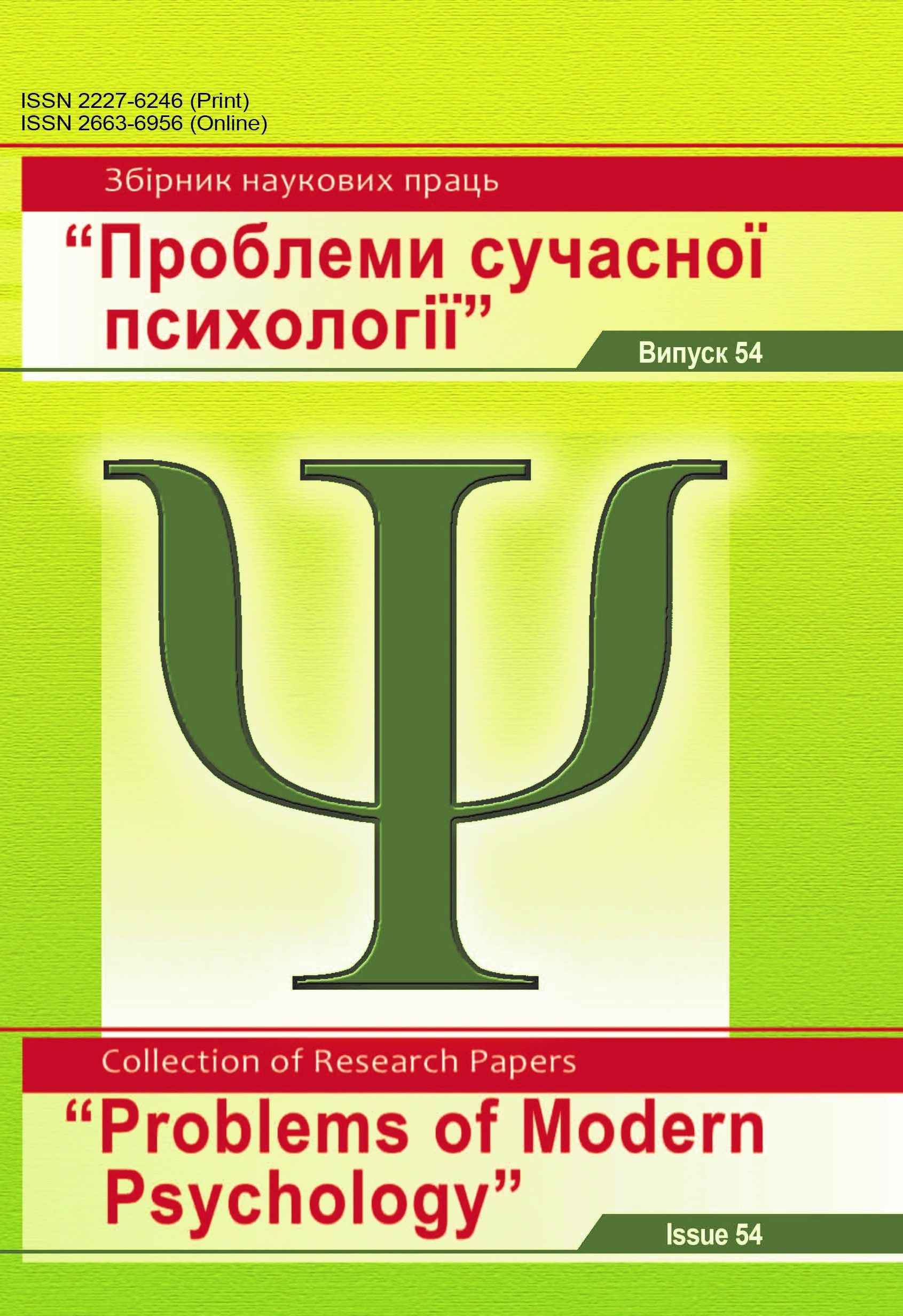Компонентна структура професійної компетентності майбутніх перекладачів
DOI:
https://doi.org/10.32626/2227-6246.2021-54.57-77Ключові слова:
професійна компетентність, спеціальна компетентність, комунікативна компетентність, соціальна компетентність, специфічна професійна діяльність, ключові професійно значущі компетентностіАнотація
Мета статті – виокремити компонентну структуру професійної компетентності майбутніх перекладачів.
У роботі використано такі загальнонаукові методи дослідження: індукція, дедукція, аналіз і синтез, порівняння й опис, обґрунтування тощо.
Експериментальним методом був метод проведення емпіричного дослідження. У якості методологічного інструментарію для першого етапу дослідження нами було обрано методику «Хто Я?» (М. Кун, Т. Макпартленд) і техніки «Мій шлях у професію» та «Піраміда професійного зростання» (розроблені М.Ю. Варбан та О.Б. Старовойтенко й адаптовані нами для майбутніх перекладачів).
Результати дослідження. Визначено структуру професійної компетентності майбутнього перекладача. Ми визначаємо професійну компетентність як реалізацію в професійній діяльності двох базових компонентів: професійно-технологічної підготовленості, що має на увазі оволодіння фахівцем технологіями здійснення конкретної професійної діяльності (оволодіння базовими і спеціальними компетентностями), й особистісного компонента, що вирізняється надпрофесійним характером, але є таким, який необхідний кожному фахівцеві з метою оволодіння ним ключовими професійно значущими компетентностями.
Висновки. Доведено, що професійну компетентність слід розглядати як особистісне утворення, що вміщує певні компоненти (або компетенції). Такими компонентами можуть бути знання, уміння і навички, а також властивості особистості. Так, згідно з цим підходом професійна компетентність включає:
- спеціальну компетентність, що передбачає наявність у фахівця певного достатнього обсягу знань у конкретній галузі діяльності, вміння їх творчо застосовувати в різноманітних ситуаціях, пов’язаних із розв’язанням теоретичних і практичних завдань і задач;
- комунікативну компетентність, що демонструє здатність індивіда сприймати та висловлювати інформацію, її достовірно відображати, підсумовувати й обґрунтовувати. Комунікативна компетентність є необхідною передумовою для здійснення міжособистісних контактів, діалогу, взаємодії, яка демонструє, наскільки людина володіє правилами і прийомами спілкування;
- соціальну компетентність, що виражається в здатності й готовності особистості встановлювати та підтримувати контакти з іншими людьми. Соціальна компетентність вважається найважливішою умовою ефективної адаптації людини до нових обставин життя і професійної діяльності. Її високий рівень допомагає фахівцеві зайняти лідерські позиції в професійному просторі.
Посилання
Varban, M.Yu. (1998). Refleksiia professionalnogo stanovleniia v studencheskiie gody [The reflection of the professional development in students’ years]. Candidate’s thesis. Samara [in Russian].
Honcharuk, N., & Onufriieva, L. (2018). Psykholohichnyi analiz rivniv pobudovy komunikatyvnykh dii [Psychological analysis of the levels of construction of communicative actions]. Psykholinhvistyka. Psikholingvistika. Psycholinguistics – Psycholinguistics. Psycholinguistics. Psycholinguistics, 24 (1), 97–117. Retrieved from https://doi.10.31470/2309-1797-2018-24-1-97-117 [in Ukrainian].
Ivashkevych, Ed., & Koval, I. (2020). Psykholohichni pryntsypy orhanizatsii deduktyvnoho protsesu na urokakh anhliiskoi movy v zakladakh serednoi osvity [Psychological Principles of Organization of the Deductive Process at the English Lessons at Secondary Schools]. Zbirnyk naukovykh prats «Problemy suchasnoi psykholohii» – Collection of research papers «Problems of modern psychology», 50, 31–52. Retrieved from https://doi.org/10.32626/2227-6246.2020-50.31-52 [in Ukrainian].
Kuhn, M., & McPartland, T. (2021). Test «Kto Ya?» [The Methodology «Who am I? »]. Retrieved from vsetesti.ru/424 [in Russian].
Maksymenko, S., Тkach, B., Lytvynchuk, L., & Onufriieva, L. (2019). Neiropsykholinhvistychne doslidzhennia politychnykh hasel iz zovnishnoi reklamy [A neuropsycholinguistic research of political slogans from outdoor advertising]. Psykholinhvistyka. Psikholingvistika. Psycholinguistics – Psycholinguistics. Psycholinguistics. Psycholinguistics, 26 (1), 246–264. DOI 10.31470/2309-1797-2019-26-1-246- 264. Retrieved from https://psycholing-journal.com/index.php/journal/article/view/715 [in Ukrainian].
Mykhalchuk, N., & Onufriieva, L. (2020). Psykholohichnyi analiz riznykh typiv dyskursu [Psychological Analysis of Different Types of Discourse]. Zbirnyk naukovykh prats «Problemy suchasnoi psykholohii» – Collection of research papers «Problems of modern psychology», 50, 188–210. Retrieved from https://doi.org/10.32626/2227- 6246.2020-50.188-210 [in Ukrainian].
Mykhalchuk, N., & Bihunova, S. (2019). The verbalization of the concept of «fear» in English and Ukrainian phraseological units. Cognitive Studies | Études cognitives, 19, 11. Warsaw (Poland). Retrieved from https://doi.org/10.11649/cs.2043 .
Mykhalchuk, N., & Ivashkevych, E. (2019). Psycholinguistic Characteristics of Secondary Predication in Determining the Construction of a Peculiar Picture of the World of a Reader. Психолінгвістика. Психолингвистика. Psycholinguistics – Psycholinguistics. Psycholinguistics. Psycholinguistics, 25 (1), 215–231. Retrieved from https://doi.10.31470/2309-1797-2019-25-1-215-231 .
Vonnegut, Kurt (2009). Cat’s Cradle. New York : American Ltd.
##submission.downloads##
Опубліковано
Як цитувати
Номер
Розділ
Ліцензія
Авторське право (c) 2021 Ернест Івашкевич

Ця робота ліцензується відповідно до Creative Commons Attribution-NonCommercial 4.0 International License.
Редакція має повне право публікувати у Збірнику оригінальні наукові статті як результати теоретичних і експериментальних досліджень, які не знаходяться на розгляді для опублікування в інших виданнях. Автор передає редколегії Збірника права на розповсюдження електронної версії статті, а також електронної версії англомовного перекладу статті (для статей українською та російською мовою) через будь-які електронні засоби (розміщення на офіційному web-сайті Збірника, в електронних базах даних, репозитаріях та ін).
Автор публікації зберігає за собою право без узгодження з редколегією та засновниками використовувати матеріали статті: а) частково чи повністю в освітніх цілях; б) для написання власних дисертацій; в) для підготовки абстрактів, доповідей конференцій та презентацій.
Автор публікації має право розміщувати електронні копії статті (у тому числі кінцеву електронну версію, завантажену з офіційного web-сайту Збірника) на:
- персональних web-ресурсах усіх Авторів (web-сайти, web-сторінки, блоги тощо);
- web-ресурсах установ, де працюють Автори (включно з електронними інституційними репозитаріями);
- некомерційних web-ресурсах відкритого доступу (наприклад, arXiv.org).
Але в усіх випадках обов’язковою є наявність бібліографічного посилання на статтю або гіперпосилання на її електронну копію, що містяться на офіційному сайті Збірника.






